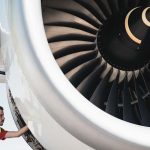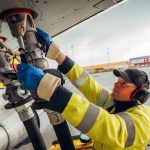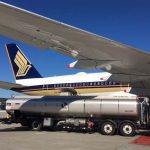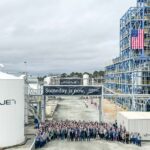Two new European-Japanese industrial partnerships have been formed to progress the transition of Japan’s air transport sector to sustainable fuels. Paris-based TotalEnergies has joined with Tokyo-based ENEOS Corporation to conduct a feasibility study into the production of sustainable aviation fuel at the latter’s Negishi Refinery by 2025, while aircraft manufacturer Airbus has signed a memorandum of understanding (MoU) with Japanese industrial group Kawasaki Heavy Industries to collaborate on the production of hydrogen fuel, its delivery to airports and its supply to aircraft. The announcements coincided with the release of a new study by global business consultancy McKinsey which highlighted increased global concern by air passengers about aircraft carbon emissions, and growing evidence that travellers were prepared to pay higher fares to help cut aircraft emissions, though only 2% in Japan were willing to do so, reports Tony Harrington.
Energy companies TotalEnergies and ENEOS said they were considering a joint venture to produce up to 300,000 tons of SAF per year from waste cooking oil or animal fats, and had commenced a study of feedstock procurement for the project, which aligns with a target set by Japan’s Ministry of Land, Infrastructure, Transport and Tourism for 10% SAF use by 2030. The partnership would leverage the experience of TotalEnergies in feedstock procurement and SAF production technology, and the production, loading and unloading facilities at the ENEOS Negishi Refinery, which is close to Tokyo’s Narita and Haneda airports, which together comprise Japan’s largest market for aviation fuel.
A joint statement to announce the collaboration said TotalEnergies was “pursuing its strategy of building a multi-energy company with the ambition to get to net zero by 2050”, while ENEOS Group’s long-term vision to 2040 “is contributing to the development of a decarbonised, recycling-oriented society”, through which the company “aims to provide a stable supply of the various forms of energy required to meet the needs of the times.”
The MoU signed by Airbus and Kawasaki is focused on preparation of a hydrogen-fuelled ecosystem, from production to plane. The companies will address challenges and develop an advocacy plan to support aviation’s hydrogen requirements, with specific focus on the establishment of airport hydrogen hubs.
Stephane Ginoux, Head of North Asia Region for Airbus and President of Airbus Japan, said the partnership with Kawasaki would “accelerate and promote” the ambitions of the Japanese government to decarbonise aircraft operations by 2050, adding: “We strongly believe that the use of hydrogen, both in synthetic fuels and as a primary power source for commercial aircraft, has the potential to significantly reduce aviation’s climate impact.”
Dr Motohiko Nishimura, Executive Officer and Deputy General Manager of Hydrogen Strategy Division, Kawasaki, said: “We have specialised in the development of infrastructure for liquefaction, transportation, storage and transport to receiving terminals, contributing to the construction and expansion of supply chains for the hydrogen market.” He expressed confidence that Kawasaki’s technology would connect hydrogen production and consumption areas, via a new ‘Hydrogen Road’.
As it has in similar collaborations in New Zealand, South Korea and Singapore, Airbus, a leading advocate of hydrogen propulsion, said it would provide aircraft characteristics, fleet energy usage and insight on hydrogen-powered aircraft for ground operations, while Kawasaki has committed to provide supply chain technology and infrastructure deployment scenarios to supply targeted airports.
Meanwhile, global business consultancy McKinsey has released details of new research that indicates greater awareness by air passengers of aviation’s impact on the environment, but vastly varying levels of commitment to help reduce emissions. McKinsey said that in 11 of the 13 countries in which air travellers were surveyed, “emissions are now the top concern of respondents”, well up on a 2019 survey in which those concerns were highest in just four markets.
However, it also found that the attitudes and preferences of air travellers varied significantly between markets, with just 2% of respondents in Japan indicating they were willing to pay to help achieve carbon neutral flights, contrasting with some 60% of Spanish respondents and 9% in India supporting the idea.
At a global level, McKinsey’s survey revealed that almost 40% of air travellers globally were now willing to pay at least 2% more for “carbon-neutral tickets”, or $20 for a $1,000 roundtrip, while 36% of survey respondents indicated they would take fewer flights to help reduce their own impact on the environment. But while the survey revealed greater awareness of aviation’s impact on the environment, it found travellers still prioritise price and connections over sustainability in booking decisions.
Photo (Airbus): Japan Airlines A350-900














More News & Features
Swiss advanced SAF technology startups Metafuels and Synhelion reach project milestones
PtX fuels have significant Asia-Pacific potential but face many barriers, finds report
Airfreight giants DHL Express and FedEx announce big US SAF deals
Asia-Pacific study reveals pessimistic outlook for SAF uptake by 2030 as Singapore details levy
Supply shortage means airlines have no chance of meeting a 10% SAF by 2030 target, says IATA chief
New Zealand initiatives announced on electric aircraft, hydrogen refuelling and carbon removals